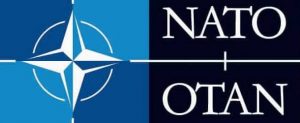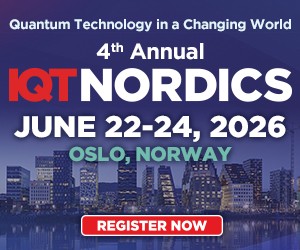Quantum News Briefs September 23: How Quantum Technologies Can Advance Sustainable Development Goals • NATO Innovation Fund’s First Quantum Tech investment Goes to Quantum Sensing Startup Aquark • Scottish Universities Coordinate Efforts to Advance Quantum Finance Software • Cook County Creates New Property Tax Break for Quantum Computing Businesses • EY & SandboxAQ Publish White Paper on “Accelerating New Chemicals And Materials With AI-Driven Simulation”

In Other News: The World Economic Forum issues report “H0w Quantum Technologies Can Advance Sustainable Development Goals”
 A new report by the World Economic Forum September 20 in collaboration with Accenture, Quantum for Society: Meeting the Ambition of the SDGs, raises awareness about the potential of quantum technologies to advance the UN’s SDGs.
A new report by the World Economic Forum September 20 in collaboration with Accenture, Quantum for Society: Meeting the Ambition of the SDGs, raises awareness about the potential of quantum technologies to advance the UN’s SDGs.
The 2030 deadline established by the United Nations to progress the Sustainable Development Goals (SDGs) agenda, quantum technologies might offer a unique opportunity to advance the 17 sustainability goals, from alleviating poverty, to decarbonizing our planet, moving to renewable energies, and improving health and well-being for all.
The power of quantum resides on its capability to advance every single SDG. But which quantum solutions should be prioritized? Some use cases identified by the Forum, such as water quality monitoring, Earth observation to support disaster preparedness, solar cell design, and climate modelling and weather forecast have a higher chance to trigger real and measurable impact, showing a multiplier effect and the capacity to boost several SDGs simultaneously. Not surprisingly, these same use cases are aligned to the Water-Energy-Food Nexus, a framework established by UNESCO to exhibit the complex and dynamic interrelationship across certain goals.
Currently, the quantum for society ecosystem is embryonic. Only an orchestrated network of business leaders, policy-makers, international organizations and academia
In Other News: TNW reports “NATO Innovation Fund’s First Quantum Tech investment Goes to Quantum Sensing Startup Aquark”
 The NATO Innovation Fund (NIF) has announced its first investment in quantum tech, leading a €5mn seed round as reported by Linnea Ahlgren in September 19 TNW. The recipient is Southampton University spinout Aquark Technologies, which has developed a unique quantum sensing technology.
The NATO Innovation Fund (NIF) has announced its first investment in quantum tech, leading a €5mn seed round as reported by Linnea Ahlgren in September 19 TNW. The recipient is Southampton University spinout Aquark Technologies, which has developed a unique quantum sensing technology.
Aquark’s patented cold atom system can be used as an alternative position, navigation, and timing (PNT) device, independent from satellites and thus immune to external tampering  such as GPS interference. Aquark calls itself a miniaturisation company. It specialises in micro-fabrication and vacuum technology. However, what really sets it apart, is that it has found entirely new ways of trapping neutral atoms.
such as GPS interference. Aquark calls itself a miniaturisation company. It specialises in micro-fabrication and vacuum technology. However, what really sets it apart, is that it has found entirely new ways of trapping neutral atoms.
While Aquark’s technology is applicable to a broad range of quantum areas, the startup has decided to focus on quantum sensing as this is where “the fastest returns and biggest impact” are to be found at the moment.
It goes without saying that if NATO is interested, there are defence applications for the technology. Aquark is also the first DIANA (Defence Accelerator for the North Atlantic) cohort company to receive direct investment from the NIF. Other investors in the round include the Export and Investment Fund of Denmark (EIFD), UKI2S (managed by Future Planet Capital), and missile developer MBDA.
In Other News: GlobalData Reports: “World-class Scottish Universities Coordinate Efforts to Advance Quantum Finance Software”

Several world-class Scottish universities – including Glasgow, Strathclyde, and Edinburgh – are part of a coordinated effort to achieve rapid advances in the development of quantum finance software applications according to September 20 GlobalData.
Professor Elham Kashefi leads the quantum computing team at the University of Edinburgh’s School of Informatics and co-founded the fields of quantum cloud computing and quantum verification. She is a respected global authority on quantum applications and has been conducting cutting-edge research in areas such as quantum verification, programming languages, machine learning and cybersecurity. The National Quantum Computing Centre recently appointed Kashefi as its chief scientist.
“We have the largest quantum software team in the UK at the University of Edinburgh, and that’s something we are very proud of,” says Kashefi. “We have been very focused on the application side and carrying out some pioneering work with fintech. We are already working with NatWest and HSBC to try and figure out exactly what their pain points are and come up with solutions.”
“Financial tech is open to innovation because it has always had very hard computational problems,” says Kashefi. “When you bring a new computational capacity to the table, fintech companies can see the advantages and are naturally very interested.”
Banks and fintechs are drawn to quantum applications because of the potential to improve security, enhance the efficiency of algorithms and offer new data strategies. Several financial services firms, including NatWest and Morgan Stanley, already employ sizeable quantum teams in Scotland.
In Other News: Chicago Tribune reports: “Cook County Creates New Property Tax Break for Quantum Computing Businesses”
 The Illinois Cook County Board quietly passed a brand new property tax break last week that would give the nascent quantum computing development on Chicago’s Southeast Side a substantial reduction on its bills for three decades, according to A.D. Quig in the October 20 Chicago Tribune.
The Illinois Cook County Board quietly passed a brand new property tax break last week that would give the nascent quantum computing development on Chicago’s Southeast Side a substantial reduction on its bills for three decades, according to A.D. Quig in the October 20 Chicago Tribune.
The creation of the new incentive comes on the heels of Illinois landing PsiQuantum, a tech company that promises to invest billions to develop a commercially viable quantum computer at the dormant South Works site, the previous home of U.S. Steel. Chicago firm Related Midwest is the developer heading the project.
In Other News: EY & SandboxAQ Publish White Paper on “Accelerating New Chemicals And Materials With AI-Driven Simulation”
 SandboxAQ has issued an 18-page white paper describing how “Advancements in high-performance computing, AI, and simulation are transforming materials discovery, an industry historically dominated by long and expensive development cycles due to high R&D costs, extensive capital investment in manufacturing, and other barriers.”
SandboxAQ has issued an 18-page white paper describing how “Advancements in high-performance computing, AI, and simulation are transforming materials discovery, an industry historically dominated by long and expensive development cycles due to high R&D costs, extensive capital investment in manufacturing, and other barriers.”
By deploying AI, quantum-inspired solutions and quantum chemistry toolkits strategically, companies can lower many of the barriers to progress in chemicals and materials discovery. These technologies not only accelerate the pace of discovery and the time-to-value but also promote efficiency and sustainability.
Running on distributed networks and featuring the latest generation of classical GPUs, enterprise SaaS company SandboxAQ merges quantum-inspired solutions and quantum chemistry toolkits with AI computation, democratizing materials discovery through physics-informed simulation and machine learning. This effectively enables any manufacturing company to move the expensive and time-intensive materials discovery process in-house.
Physics-based simulation and AI can lead to new and improved material discovery while widening accessibility and empowering companies toward scientific advancement and product development.
Authors of this extensive report are: Dr. Kristin Milchanowski Gilkes, Global Innovation Quantum Leader, EY: Dr. Ang Xiao, AI for Chemistry Lead, SandboxAQ; Dr. Adam Lewis, AI and Quantum Lead, SandboxAQ













